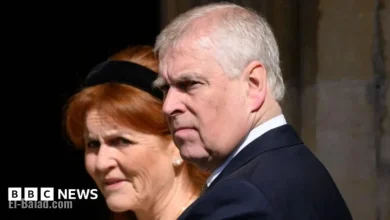Why are foreign criminals being paid to leave the UK?

By ITV News Producer Hannah Ward-Glenton
Convicted sex offender Hadush Kebatu was given £500 when he was deported from the UK on Tuesday night.
He arrived in Ethiopia on Wednesday morning, with no right to return to the UK, according to the Home Office.
But why was a criminal given money to leave the UK? ITV News explains.
How do criminals leave the UK?
In 2006, the government established the facilitated return scheme, so that it is possible to return people to their country of origin if they commit a crime in the UK.
The main aim of the scheme was to encourage foreign national offenders to leave the UK voluntarily “at the earliest possible opportunity” to reduce the costs and resources associated with keeping somebody in prison or immigration detention.
As part of the facilitated return scheme, the offenders receive financial support to encourage them to cooperate with their removal.
Along with the facilitated return scheme, there is also voluntary return for migrants who have not been convicted of a crime. This gives migrants in the UK support to return home if they meet certain criteria, such as by being in the UK illegally, overstaying a visa, or having made a claim for asylum which was rejected.
People eligible for voluntary return are also able to access financial support from the UK government.
People who are subject to enforced removal from the UK are not typically offered any money, but each person is judged on a case by case basis.
Deportation flights take off several times a week from Britain. Last year over 5,000 foreign national offenders were deported, a rise on the year before.
Subscribe free to our weekly newsletter for exclusive and original coverage from ITV News. Direct to your inbox every Friday morning.
Which offenders are eligible to be returned to their home country?
Any foreign national offender could be eligible for the facilitated return scheme if they fulfill the criteria – that includes anybody with a British Overseas Citizen passport, British National Overseas passport or any other non-British citizen passport.
British citizens are exempt from the facilitated return scheme.
Participation in the scheme is voluntary, but it does not replace enforcement action. All departures must comply with UK law and international obligations.
Applications are reviewed by a dedicated Home Office team, with stricter checks for serious offences.
Acceptance can be withdrawn if someone fails to comply with the rules or causes delays.
How much money can foreign national offenders receive?
All foreign national offenders are eligible to receive money as part of the facilitated return scheme.
The amount of money they receive depends on whether or not they receive a prison sentence, and if so, whether they are still serving that sentence or if they have completed their sentence.
If they apply while they are still in custody, they can receive more money – this is to try and encourage people to leave earlier.
The Home Office lists the following grants as being available under certain circumstances:
£750
-
For foreign national offenders who apply and have completed their prison sentence;
-
For foreign national offenders who have received a conviction abroad;
-
For foreign national offenders with UK convictions not linked to a prison sentence.
£1,500
-
For foreign national offenders when the application is made while they are still serving their prison sentence;
-
For qualifying family members.
Additional £500
-
An extra £500 can be made available to a small number of vulnerable of foreign national offenders, for example if they are pregnant, are considered “mentally disordered”, have physical disabilities, are destitute or homeless, are elderly, or if they have a serious illness or life-limiting condition.
If a person meets the criteria for voluntary return, they may receive up to £3,000 in financial support. This is different to the facilitated return scheme in that people who apply for it are not convicted criminals.
Hadush Kebatu, who was wrongly freed from HMP Chelmsford on Friday morning instead of being sent to an immigration detention centre, had applied for the facilitated return scheme, but that application was rejected, Downing Street said on Wednesday.
He was instead offered a £500 “discretionary payment” after threatening to disrupt his deportation.
It is understood the payment was an operational decision made by the removal team as an alternative to the slower and more expensive process of further detaining Kebatu and putting him on a new flight, which could have faced a legal challenge.
Where does the money come from?
The UK Home Office funds the facilitated returns scheme. Indirectly, the money comes from public money, as the Home Office is supported by taxpayer money.
How do offenders receive the money?
Foreign national offenders receive the full amount of money on a pre-paid card that can used when they have left the UK.
Why are foreign national offenders given money?
The government says foreign national offenders are expected to use the money “to actively reintegrate into life” in their home country.
It says the resettlement grant should be put towards “meaningful activities aimed at creating a stable, settled life in the country of return”.
It suggests setting up a business, partnership or buying into an existing business, education or vocational studies, housing or medical expenses.
The government has said it is cheaper in the longer term to provide these payments instead of detaining foreign national offenders.
In an interview with ITV News in September, Home Secretary Shabana Mahmood said a voluntary removal “is actually cheaper for the British taxpayer”.
“It has long been the case that we do offer financial packages as an incentive to people to drop their claims and drop the attempts they make to stay in our country, and to board a flight and leave,” she said.
From Westminster to Washington DC – our political experts are across all the latest key talking points. Listen to the latest episode below…




